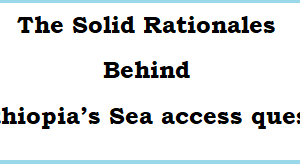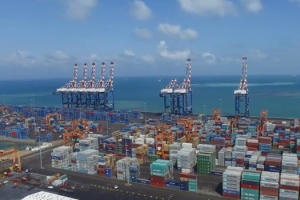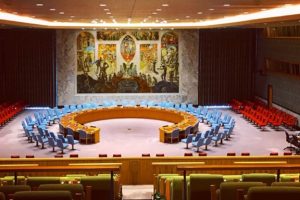
BY ADDISALEM MULAT
The Ethiopian National Dialogue Commission (ENDC) has made remarkable progress in its preparations for the upcoming national dialogue. At present, the commission is focused on finalizing the agenda for the discussion and selectively choosing participants who will have a significant impact on the dialogue’s success. The commission recognizes its duty to assist and facilitate the national dialogue and is dedicatedly working towards achieving it.
The national dialogue is an important tool for enhancing the culture of democracy and inclusiveness. By providing a platform for meaningful conversations, it can help to promote democratic values such as participatory decision-making and inclusivity. It can also help to address social and political divisions and to build stronger, more cohesive communities. Ultimately, the national dialogue is an essential component of any democratic society, and it is important that governments and citizens alike support its use as a means of promoting positive change.
Through the national dialogue process, Ethiopians from different backgrounds, communities, and walks of life can come together to discuss common concerns. When people feel they are being listened to and that their opinions matter, they are more likely to participate in the democratic process and work towards positive change. Inclusiveness is another critical value of democracy. It means that everyone should have equal opportunities to participate in the decision-making process, regardless of their background or social status.
The national dialogue can help promote this value by providing a safe space for people to share their experiences and ideas. By creating an environment that encourages participation from all groups, the national dialogue can foster a sense of ownership, accountability, and transparency in decision-making processes. Moreover, the national dialogue can help address social and political divisions within Ethiopia. Diverse groups often disagree on various matters, based on factors such as political affiliation, ethnicity, religion, and other factors.
The national dialogue can facilitate constructive engagement and collaboration between these groups, creating a forum where people can find common ground and work towards shared goals. In doing so, the national dialogue can bridge divides and foster stronger, more cohesive communities. Overall, the National Dialogue Commission’s initiative reflects the government’s commitment to promoting democratic principles and inclusive decision-making.
By initiating such a process, the Ethiopian government has demonstrated its willingness to listen to all voices and perspectives and to adopt an approach that is based on dialogue, consultation, and consensus-building. This approach can help to promote greater transparency and inclusiveness, foster stronger democratic institutions, and lead to a more prosperous and harmonious Ethiopia.
Ethiopia is a country that has a diverse population with different ethnicities, beliefs and political ideologies. This diversity has led to various conflicts such as inter-ethnic tensions and political rivalries between different groups. These conflicts have, in turn, hindered the country’s progress towards unity and development. However, the Ethiopian government recognized the need to address these challenges and promote unity among its people.
As a result, it took a proactive step by establishing the National Dialogue Commission, which aims to facilitate discussions and promote peaceful coexistence among different groups within the country. Through this initiative, the commission hopes to mitigate tensions and encourage dialogue between conflicting parties, ultimately promoting peace and unity in Ethiopia.
The main objective of the commission is to create a platform for different groups and citizens to have constructive dialogues on issues that are crucial for the nation’s development and progress. The commission understands that it is essential to establish a common ground to achieve this aim, which requires an inclusive environment where all members of society can participate and express their opinions freely.
To achieve this goal, the commission aims to foster an open and inclusive environment where individuals can express their thoughts and ideas without fear of judgment or discrimination. The commission believes that this will encourage more people to participate in the dialogues, leading to a diversity of perspectives and solutions for the issues at hand. The National Dialogue Commission has developed a strategy to address conflicts and hostilities that have emerged due to differing opinions, ideologies, and beliefs.
Ethiopia’s government has taken a significant stride towards fostering peaceful coexistence, stability, and harmony among its citizens by instituting the National Dialogue Commission. This development is a tangible demonstration of the government’s unwavering dedication to creating a society that is accepting of all people, regardless of their backgrounds, beliefs, or opinions. It is an important move towards building a cohesive and inclusive community that values diversity, mutual respect, and understanding.
The establishment of the National Dialogue Commission reflects the government’s recognition of the need for constructive engagement and collaboration between different groups in Ethiopian society. By initiating such a body, the Ethiopian authorities have demonstrated their willingness to listen to all voices and perspectives and to adopt an approach that is based on dialogue, consultation, and consensus-building. This approach will help to foster healthy relationships between individuals and groups, reduce conflict, and promote peaceful coexistence.
The Ethiopian government’s decision to set up the National Dialogue Commission is a commendable action that signals its commitment to creating a stable, peaceful, and cohesive society. It is an indication that the government recognizes the value of diversity and is committed to promoting mutual respect, understanding, and engagement among all its citizens. The establishment of this commission represents a critical step forwards in Ethiopia’s ongoing journey towards building a brighter, more inclusive future for all.
By establishing a National Dialogue Commission, Ethiopia and other countries can pave the way for a more peaceful and equitable future. This initiative is significant as it helps break the cycle of violence, promote healing and understanding, and create a society where justice, fairness, and equality are upheld. It provides an opportunity for all parties involved to voice their opinions and be heard, leading to a sustainable peace process where everyone’s needs are addressed and respected.
The initiative of having an inclusive national dialogue process is an attempt to establish a forum that can offer a secure and inviting space for Ethiopians from all backgrounds to participate in conversations about the future of their nation. The objective is to foster an environment that encourages individuals to share their views, perspectives, and imaginings about the path they envisage for their land.
The primary intent behind the inclusive national dialogue process is to encourage people from diverse backgrounds to come together and engage in constructive and respectful discussions. It is an effort to ensure that every voice is heard, regardless of social class, ethnicity, or any other distinguishing characteristic. The idea is to create a space where participants can express their opinions candidly, without fear of recrimination.
The dialogue process in Ethiopia is aimed at achieving a primary objective, which is to promote the values of open communication and encourage participation among different members of society. The ultimate goal is to ensure that everyone has an equal opportunity to express their opinions and ideas, regardless of their cultural background, social class, or any other factor. This process seeks to create a platform where all voices are heard and taken into account when discussing the future of the nation.
The bottom-up approach to this conversation process also allows for different perspectives, experiences, and concerns from various regions to be considered when making decisions that could potentially affect the whole nation. The intent of this approach is to achieve a more inclusive and diverse dialogue, which will ultimately lead to more informed, balanced, and fair decisions. By involving individuals from the local communities in the conversation, it’s possible to develop a more holistic understanding of the issues that affect different regions of the country.
The national dialogue process currently being implemented in Ethiopia is a highly innovative initiative that has immense potential to bring about remarkable transformations within the country. What makes this effort particularly noteworthy is the fact that it has been launched at the grassroots level, where citizens from all walks of life are invited to participate and share their opinions on vital matters affecting their daily lives.
The Ethiopian National Dialogue Commission (ENDC) stated that it will finish the designing of agenda and selection of participants for the national dialogue in the coming weeks.
In an exclusive interview with ENA, National Dialogue Commission Chairperson Professor Mesfin Araya said the commission has been in the process of selection of participants and designing agenda by gathering ideas from the grass roots across the country.
Selected participants from over 1,300 woredas will select their representatives at zonal level and agendas for the national dialogue will be collected at the capital city of the respective regional states, he added.
Collecting agendas, which is the vital task of the commission, will also be finalized before the conclusion of this Ethiopian budget year and submitted to the National Dialogue Commission, it was learned. According to the chairperson, the inclusive national dialogue, which is the first of its kind to the country, starts at the grass roots and moves upwards.
The professor finally noted that “we use this chance (the national dialogue) properly and carefully.” He believes that the national dialogue will also play a role in enhancing the culture of democracy and inclusiveness.
The Ethiopian Herald June 1/2023





